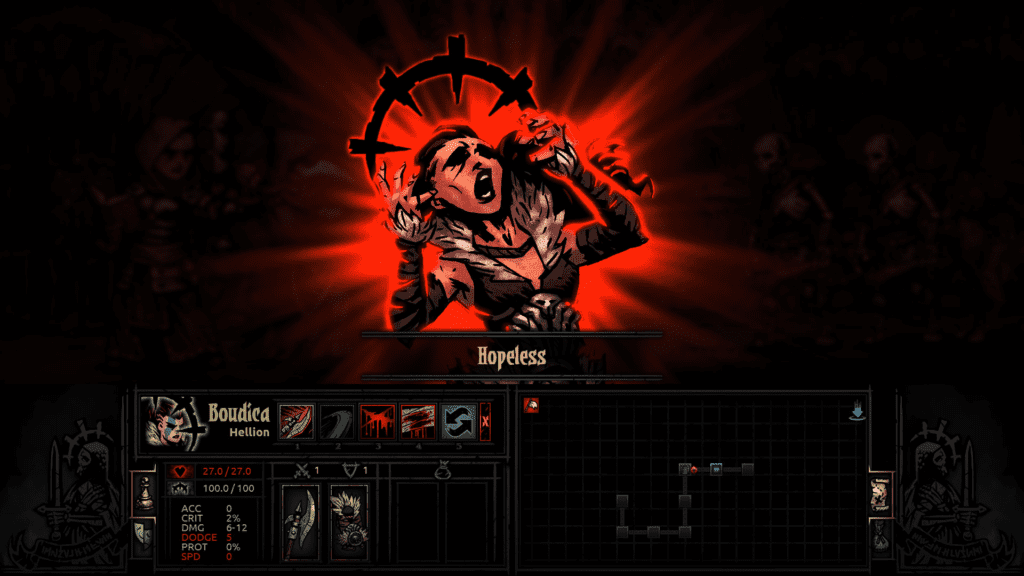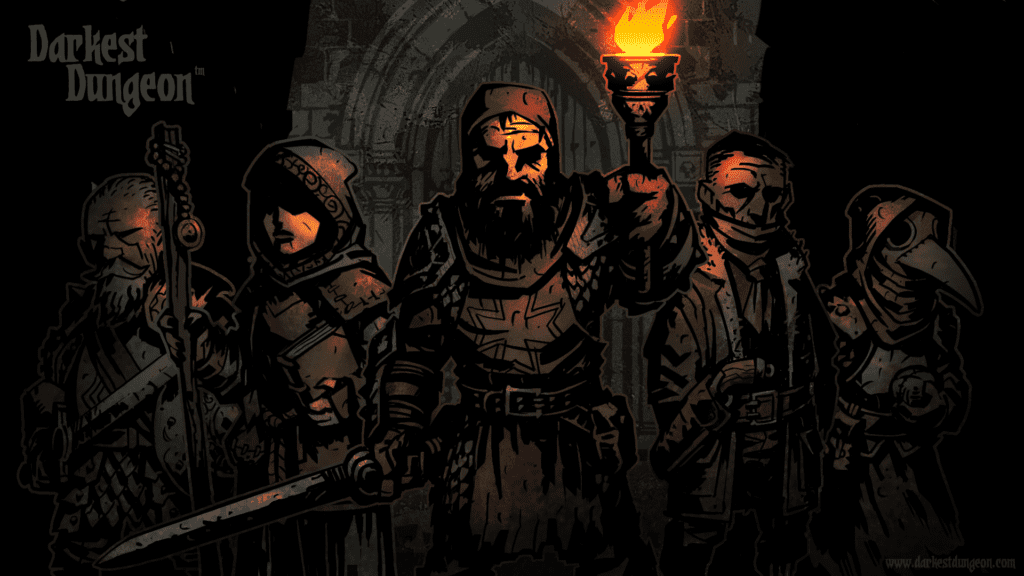I recently added Darkest Dungeon to my gaming collection, only three years behind everyone else. The game was initially attractive to me because of its unforgiving permadeath and a stress system that explores a realistic interpretation of the effects a dungeon crawl would have on a person’s mind. But I quickly discovered this only touched the surface of the philosophical depths that lay within this game.
It was easy to see the permadeath and stress systems as novel additions to what was otherwise your standard turn-based role-playing game. The game is continuously saving over any progress made, so if you lose an adventurer they are gone. Stress adds something else you have to manage, on top of everything else.
Stress remains with the characters after an expedition, much like the horrors they’ve seen would remain in their minds. If allowed to get too high, their stress causes the characters to develop ‘afflictions’ that mimic mental breaks through in-game mechanics. After developing afflictions treatment is required to rid the characters of them. These afflictions can affect anything from how much damage a character can deal to how much they’ll listen to the player. In a similar way, the characters can develop more permanent ‘quirks’ that affect their stats, either positively or negatively. If stress reaches its highest levels it’s almost certain that the character will die.

The stress system works in tangent with a light system in the dungeons. The player has partial control of the light in dungeons. The light can affect the damage output of enemies as well as the loot collected. The darker it is, the more damage and stress dealt but conversely, the more loot gathered. The reverse is also true, so players can control how much they’re willing to risk for that bigger reward.
In spite of this, all the usual elements of role-playing games are still there. You recruit adventurers of different classes to round out a team, tackle dungeons where you fight enemies, and gather loot. You then use that loot to make your adventures better so they can tackle stronger enemies. Losing adventures early on is disappointing but ultimately recoverable. After all, there is always a roster of new adventurers to recruit.
The first time I truly felt the death of a character was also the first time I realized just how insidious the mechanics of Darkest Dungeon are. A string of bad luck and some poor moves resulted in the loss of one my highest level adventurers at that point. This was a deeper blow than any death before, and not just because it was a higher level.
Leveling up in the Darkest Dungeon gives a small boost to a character’s stats, but it only unlocks the ability to upgrade better equipment and moves. For the characters to truly get stronger, you’ll need to invest gold and other resources into them. This is why the loss of a higher level character was such a crushing blow. Not because they died, but because all the gold spent in them was now a wasted investment.
Almost everything in Darkest Dungeon requires resources. Upgrading the characters. Healing their stress. Upgrading the facilities where you do all of this. Even heading out to a dungeon to gather those resources is going cost a few hundred gold at the very least. Everything cost something. Everything, except recruiting new adventurers. It’s always free to hire new adventurers and there will always be new adventurers after every dungeon run.
Early on in the game, before unlocking most of the bonuses it’s costly to treat the stress your adventurers gain while on missions. It’s all too common to spend most of the gold just earned in a dungeon treating the characters for their stress. Depending on how much stress they have, this doesn’t completely heal their stress either. It’s a valid strategy to recruit some adventurers, do a dungeon run with them, then dismiss them and recruit new adventurers as replacements. It’s cheaper and frees up gold to invest in your ‘better’ adventurers.
Stress and permadeath seem like the core of Darkest Dungeon’s mechanics, but the shining feature of the game is the unspoken morality embedded in the gameplay. Or rather I should say, the unspoken immorality. It’s up to the player how much stress they’re willing to let their adventurers endure and whether or not they’re worth keeping after developing too many negative quirks.
In the Darkest Dungeon, the adventurers you recruit may be called heroes, but you certainly aren’t. The player in Darkest Dungeon doesn’t play as the characters who enter the dungeons. This is made clear by the fact that the characters can disobey or ignore player input depending on their afflictions or quirks. The player is, instead, the heir of a once noble and affluent family that has fallen to ruin.
The story of the Darkest Dungeon is you, the player, are tasked by your ancestor to return your family name and homestead to its former glory. You do this by ridding the area of the monsters and marauders who have taken up residence. The further you progress in the game the more you learn of your ancestor. Driven by an insatiable desire for power and money he directly or indirectly created all the enemies in the game. The monsters are the products of his dealings with dark magic. Brigands and bandits you encounter were brought together by the ancestor to do his ‘messier’ tasks. The hamlet that serves as the game hub is small and derelict because of his influence.
The truth of the Darkest Dungeon is you are destined to repeat the actions of your family. As the heir, the player is an unseen and omnipotent presence in the game. You control everything and there’s no way for the heir to die. Or even face any kind of physical or mental harm. Meanwhile, no matter how you play you’ll be subjecting your adventurers to horrors and stress that break their minds. When they die, you’ll replace them with new blood right away. The game incentivizes the player to be cruel to the characters, forcing them to endure greater stress and stronger enemies for the sake of better loot.

The adventurers are turned into another resource for the player. In fact, the adventurers are the most disposable resource in the game. They are always free and always plentiful. These adventurers aren’t going to impact the story. No matter how many die or live, they’re all pawns of the player as they repeat the cycle that brought the family to ruin.
There is no morality scale in Darkest Dungeon. Not like other games that give you an indicator of how ‘good’ or ‘bad’ you are. The morality is in the mechanics. It’s in the endless line of free bodies provided to do the players bidding. No matter how ‘good’ you try to be, there’s no escaping the fact Darkest Dungeon turns the player into a villain. But then, a villain is always the hero of their own story.

